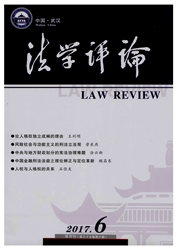

 中文摘要:
中文摘要:
我国当下乏力的制度规范及囿于传统管制导向的学理思维,已经难以满足对特许经营权利提供切实有效的保障。以保护特许经营权利为中心,藉由生成逻辑获知其权能性质,并以此为基点明晰其法治边界,可为关涉主体的权利(权力)义务(责任)配置提供一个新的分析框架。据此分析框架,特许经营权利源自于作为公共利益外化结果的特许经营协议,但其权利空间不仅限于特许经营协议,还包括未作明示的属于经营权的当然权利。面对实践中特许经营所涉法律关系的尴尬境遇,国家应当由幕后走向前台,发挥其应有的调控职能,且政府介入亦有国家担保责任和财产权社会义务之理论基础。但是,政府介入行为除遵循已有法律规范外,应承继《行政许可法》相关条款的法治经验,并在施以行政法一般原则统制时,注意“不对称管制”等特殊规则的应用。
 英文摘要:
英文摘要:
It is hard to provide an effective guarantee for the franchise right in China because of the weak regulation and conventional supervision oriented thought in academic research. Our research focuses on the protection of the franchise rights. We can get its nature from the generation logic of power and clarify its boundary under the rule of law, which provides a new a naiysis framework for a proper arrangement of configured right (power) and duty (responsibility) of relative subjects. The franchise right is derived from franchise agreement serving as an externalization of public imferests, which is not only confined to the franchise agreement, but also includes the basic contents from the right of management. Facing with the practical diffi- culties of legal relationship of the franchise, government should go from behind the scenes to the front desk to activate its con trol function. There already exists the foundation of the state guarantee responsibility and the social responsibility of property right. But governmental intervention theoretically should not only follow the existing legal norms, but also inherit the experi- ence or the relevant provisions of the administrative permission law, apply the general principles of administrative law, and pay attention to the application of the special rules, such as "asymmetric regulation".
 同期刊论文项目
同期刊论文项目
 同项目期刊论文
同项目期刊论文
 期刊信息
期刊信息
